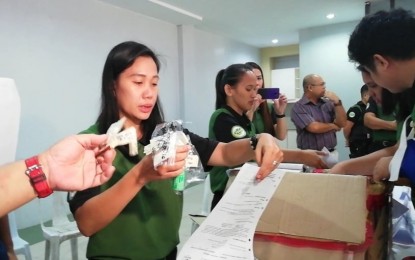
DRUG DESTRUCTION. Personnel of the Philippine Drug Enforcement Agency in Region 6 conduct an inventory of drugs surrendered from court and pharmaceutical companies on Thursday (Dec. 12, 2019) at Gegato Abecia Crematory in Jaro, Iloilo City. The burned seized dangerous drugs and expired medicines worth around PHP8.8 million. (PNA photo by Gail Momblan)
ILOILO CITY -- The Philippine Drug Enforcement Agency in Western Visayas (PDEA 6) destroyed illegal drugs and expired medicines worth PHP8.8 million on Thursday.
The PDEA 6, through its laboratory section’s evidence custodian, has gathered drug evidence on decided cases from different courts all over the region, said Alex Tablate, its regional director, in an interview.
Evidence surrendered from courts included shabu with a total value of PHP7.1-million and marijuana worth PHP79,144.
“These drugs subject for destruction are (pieces of) evidence that for the meantime retained in the court and returned to us for destruction. What we recovered from the operations were included in the inventory,” Tablate said.
The PDEA 6 again conducted an inventory of drugs up for destruction on Thursday at the Gegato Abecia Funeral Homes and Crematory, Inc, at Jaro district here.
Illegal drugs destroyed were those confiscated from 2002 to 2017.
Among the drugs subjected to destruction were expired medicines surrendered by hospitals and pharmaceuticals with a value of PHP1.5 million.
“They (hospitals and pharmaceuticals) are required to surrender because our drug regulation officers conduct regular inventory. From time to time, we see that some medicines are expired so they voluntarily surrender these drugs,” Tablate said.
He assured the destruction of the drugs through burning was done according to the guidelines of the Department of Environment and Natural Resources-Environmental Management Bureau (DENR-EMB).
He said the burning of seized drugs must be done in a crematory facility and not in an open field to prevent any harmful effects to the public and the environment.
Tablate said the facility at Gegato Abecia Funeral Homes and Crematory, Inc, is ideal since it is equipped with a machine, which burns the substances in two steps.
“First, the substance is burned by the first burner to a temperature of 1,000 degrees centigrade, then the vapor and other partially combusted substance are then heated to a temperature of 1,500 degrees centigrade by a second burner,” he said.
The PDEA regional director said the protocol in the burning of drugs assures that there will be no recycling of drugs happening in the agency. “Its end product is carbon dioxide and water, which cannot be recycled,” he said.
The previous destruction of dangerous drugs of the PDEA-6 took place on June 15, 2016.
Although the agency has no requirement as to how often to conduct the destruction, Tablate said the PDEA and the Police Regional Office in Western Visayas (PRO 6) are considering to hold the destruction yearly.
“This destruction now is our initiative but it is better for us to conduct this activity every year since there were drug cases that were decided by the court yearly,” he said.
The yearly destruction will cover pieces of drug evidence in cases with finality and also those evidence under cases with plea bargaining.
“Hopefully, we can include those with the cases on plea bargaining since the accused already admitted to the crime,” he said. (PNA)
